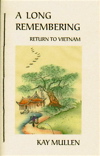~JANET MCCANN~
KAY
MULLEN: A LONG REMEMBERING:
RETURN TO VIETNAM
The poems are not about the Babylift only, clearly,
but examine ideas
and feelings about what home means.
They look at the devastation war
causes — and become
quietly powerful arguments against war. Human and
spiritual
values are invoked and explored in a non-dogmatic,
open-hearted way. These poems have a generosity of spirit
that
communicates itself to the reader.
In 1975, Operation Babylift brought more
than 2000 orphans or abandoned children for adoption into homes all
over the world. It had a tragic beginning. The first military
evacuation flight, a cargo plane loaded with over 300 crew, children
and adult escorts, crashed shortly after takeoff, and many of the
babies and their escorts were killed. This tragedy raised awareness of
and sympathy for the project, and many successful
evacuations followed.
Operation Babylift passed into history, but not for those babies who
were brought up by their adoptive parents, and not for these parents
themselves. Kay Mullen has written a tender and beautiful book of poems
about her return to Vietnam with her adopted son, now a young man, and
his meeting with the land of his birth, and about the impression his
land made upon her, a visitor.
sympathy for the project, and many successful
evacuations followed.
Operation Babylift passed into history, but not for those babies who
were brought up by their adoptive parents, and not for these parents
themselves. Kay Mullen has written a tender and beautiful book of poems
about her return to Vietnam with her adopted son, now a young man, and
his meeting with the land of his birth, and about the impression his
land made upon her, a visitor.
A Long Remembering
is Kay Mullen's second collection of poetry; her first was Let Morning Begin (2001). Her
sensitive eye for detail and her knowledge of human relationships
provide for spellbinding poetry. Her sympathy for her son's viewpoint
blends with her own vision. Past blends into present. The details
are rendered in swift, telling strokes, and they are rich with symbolic
suggestion. Many of us have only the vaguest image of rice paddies when
someone says the word "Vietnam." This book is rich with the
culture of the country and the tortured history of its inhabitants.
The poems are not about the Babylift only, clearly,
but examine ideas and feelings about what home means. They look
at the devastation war causes — and become quietly powerful arguments
against war. Human and spiritual values are invoked and explored
in a non-dogmatic, open-hearted way. These poems have a
generosity of spirit that communicates itself to the reader.
The book — with a lovely cover by an anonymous
Vietnamese artist — is divided into three almost equal parts. The
first part, "The Return," chronicles the visit to Vietnam of the young
adopted son and his parents. "In the Wake of War" captures
glimpses of the son's past and that of his countrymen, and "Rivers Run
On" is a broader picture of religion, culture, and daily life in
Vietnam.
In the poems of "The Return," mothers' and sons'
perspectives are given in the poems of departure and reunion. In
"Music Box," she addresses her baby son, arriving with "all you own in
a
paper sack . . .," including one toy, a music box that plays "Its a
small world." Most of the poems are swift, memorable vignettes of
her visit with him to his homeland — word-photographs, subtle haiku.
In the next section, the poems explore the son's
legacy. The lost birthparents appear in the imagining of the
speaker, who seems to be communicating with them. The painful
memories of the crash alternate with thoughts of the son's
wedding. These poems' arrangement suggests a timelessness, a
dimension in which all events coexist.
The final section includes well-sketched, evocative
scenes of Eastern life and thought. "Bonsai at the Potters Stall"
describes the miniature potted trees: "Oranges / the size of
marbles dangle / from trees with glossy leaves." The conclusion
shows the potter's hope that through his craft, he is able to keep his
world under his control.
The potter
prizes his bonsai children
who will never grow up,
never leave home.
Poems like "Eight Confucian Categories of Sound" and
"Zen Garden" communicate the feeling of the Vietnamese life
through vibrant multi-sense images. Brief notes at the end help
locate some of the poems in family and local history.
A Long Remembering
helps us remember the events, but the poems are much more than a
history lesson. They remind us how personal the losses and
devastation of war are and how important each fragile human being is to
the scheme of things. These are anything but despairing
poems; they are luminous with transcendent values and they provide a
sense of healing. A Long
Remembering shows how love is as strong a force as war, and as
enduring.
Mullen, Kay. A Long Remembering:
Return to Vietnam. Kanona, NY: Foothills Publishing, 2006. ISBN:
0-941053-94-6 $15.00
© by Janet McCann



![]()
![]()
![]()
![]()